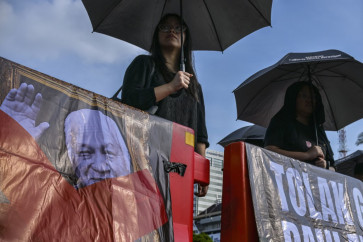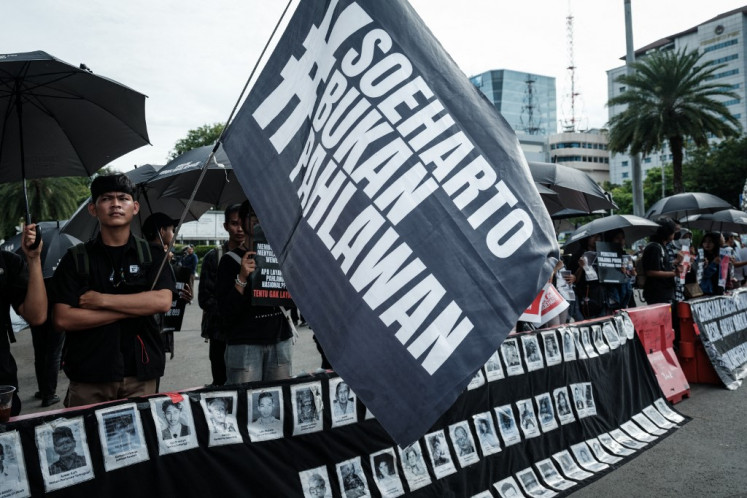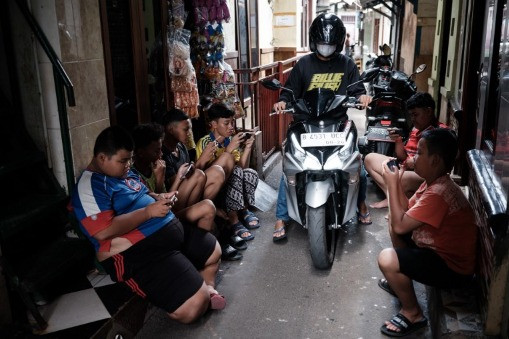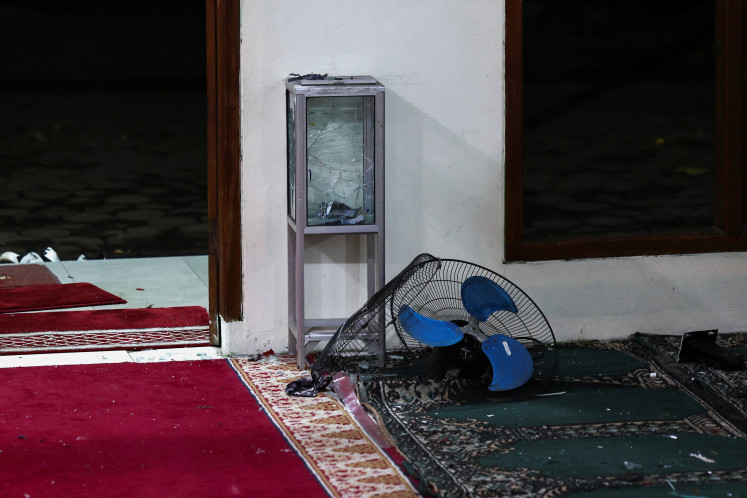Popular Reads
Top Results
Can't find what you're looking for?
View all search resultsPopular Reads
Top Results
Can't find what you're looking for?
View all search resultsGovt hopes Wuling will start auto production on schedule
Partners: Industry Minister Saleh Husin (right), accompanied by POSCO general superintendent An Tong-il (left), pays a visit to the POSCO, South Korea, on Sunday
Change text size
Gift Premium Articles
to Anyone
 Partners: Industry Minister Saleh Husin (right), accompanied by POSCO general superintendent An Tong-il (left), pays a visit to the POSCO, South Korea, on Sunday. POSCO and state-run steel giant PT Krakatau Steel jointly operate the Krakatau Posco mill in Cilegon, Banten. Saleh is asking POSCO to also produce steel for the automotive industry that is now being boosted as part of an acceleration of infrastructure projects.(Courtesy of the Industry Ministry) (right), accompanied by POSCO general superintendent An Tong-il (left), pays a visit to the POSCO, South Korea, on Sunday. POSCO and state-run steel giant PT Krakatau Steel jointly operate the Krakatau Posco mill in Cilegon, Banten. Saleh is asking POSCO to also produce steel for the automotive industry that is now being boosted as part of an acceleration of infrastructure projects.(Courtesy of the Industry Ministry)
Partners: Industry Minister Saleh Husin (right), accompanied by POSCO general superintendent An Tong-il (left), pays a visit to the POSCO, South Korea, on Sunday. POSCO and state-run steel giant PT Krakatau Steel jointly operate the Krakatau Posco mill in Cilegon, Banten. Saleh is asking POSCO to also produce steel for the automotive industry that is now being boosted as part of an acceleration of infrastructure projects.(Courtesy of the Industry Ministry) (right), accompanied by POSCO general superintendent An Tong-il (left), pays a visit to the POSCO, South Korea, on Sunday. POSCO and state-run steel giant PT Krakatau Steel jointly operate the Krakatau Posco mill in Cilegon, Banten. Saleh is asking POSCO to also produce steel for the automotive industry that is now being boosted as part of an acceleration of infrastructure projects.(Courtesy of the Industry Ministry)
P
span class="caption">Partners: Industry Minister Saleh Husin (right), accompanied by POSCO general superintendent An Tong-il (left), pays a visit to the POSCO, South Korea, on Sunday. POSCO and state-run steel giant PT Krakatau Steel jointly operate the Krakatau Posco mill in Cilegon, Banten. Saleh is asking POSCO to also produce steel for the automotive industry that is now being boosted as part of an acceleration of infrastructure projects.(Courtesy of the Industry Ministry)
Industry Minister Saleh Husin is hoping that Chinese car manufacturer SAIC-GM-Wuling (SGMW) will be able to kick off the production of the company's Indonesian unit in 2017, according to the initial schedule.
Saleh promised to provide any assistance needed to ensure that the Chinese carmaker's Indonesian investment could be implemented as expected.
Speaking during a recent visit to SGMW's factory in Qingdao, Southeast Beijing, China, Saleh said that the government would continue to improve the investment climate so that foreign companies like SGMW would be able to operate according to the plan.
'We have to support our global investors. The first focus is to create a conducive atmosphere and the second is to ensure they really produce,' he said.
SGMW, which has the biggest market share in the Chinese automobile market, is currently building its Indonesian plant with an investment of up to US$700 million in the Deltamas industrial estate, Cikarang, Bekasi, West Java.
PT SGMW Motor Indonesia president director Xu Feiyun said that the company aims to start operating the plant in July 2017 with a capacity of producing 150,000 Wuling cars a year.
Minister Saleh challenged the company to build its car engine in Indonesia so that it would also be able to export them to other ASEAN members and Australia.
'Ideally, a car producer should also build a car engine factory, not only build an assembly plant,' he added.
The Chinese company promised it would at least use local components so that the car production in Indonesian would also benefit local suppliers. 'We hope we will be able to achieve a proportion of 50 percent local components in the near future,' Xu said.
The presence of Wuling cars are expected to give Indonesian people another option. At present, the Indonesian car market is still dominated by brands from Japan, South Korea, Europe and the United States.
Saleh said that the Chinese auto brand will apparently have to convince the local market with its quality when competing against the established players.
Separately, he also encouraged South Korean steel maker POSCO ' formerly known as Pohang Iron and Steel Company ' to also produce steel for the automotive industry.
POSCO has operated an integrated steel mill in Cilegon, Banten for several years in cooperation with state-owned company PT Krakatau Steel.
The joint venture, Krakatau Posco, can now produce up to 3 million tons of steel each year and it hopes to expand its production capacity to 6 million tons after completing an expansion project.
Saleh expects the company to be able to produce steel for the needs of the automotive industry, such as steel for car frames or exteriors.
'I want POSCO to go all out. We invite you to also build downstream businesses to make thinner steel for cars and motorcycles,' he said at the POSCO steel mill in Gwamyang office, South Korea, on Sunday.
POSCO CEO Kwon Oh-joon stated his company's commitment to strengthen the integrated steel mill. 'POSCO is committed to build up the upstream and downstream sectors. We ask for your support to make it happen soon.' (rbk)









